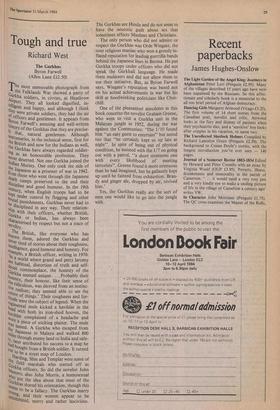Tough and true
Richard West
The Gurkhas Byron Farwell (Allen Lane 12.50)
The most memorable photograph from the Falklands War showed a party of Gurkha soldiers, in civvies, at Heathrow AirPort. They all looked dignified, in- telligent and happy, and although I think they were private soldiers, they had the air of officers and gentlemen. It appears from Byron Farwell's amusing and well-written history of the Gurkhas that they are precise- ly y that, natural gentlemen. Although Mercenaries, in the technical sense, first for the British and now for the Indians as well. the Gurkhas have always regarded soldier- ing as an honourable profession. They 'lever deserted. Not one Gurkha joined the "ari Mutiny. One only took the side of ,gle Japanese as a prisoner of war in 1942. cven those who went through the Japanese death camps preserved to the end their discipline and good humour. In the 19th cLentory, when English troops had to be ,'ePt under control by flogging and other be punishments, Gurkhas never had to °e disciplined in any way. Their relation- ship with their officers, whether British, Gurkha or Indian, has always been characterised by respect but not a trace of servility. The British, like everyone who has known them, adored the Gurkhas and
!lever tired of stories about their toughness,
,Inielligence, good humour and honesty. For :,kathPle, a British officer, writing in 1970: '11 a world where grand and petty larceny are habitual, distortion of truth and self- deceit commonplace, the honesty of the Gurkha seemed unique. . . Probably their honesty, their honour, like their sense of tL t"le ridiculous, was derived from an instinc- tive realism; they seemed able to see the centre of things.' Their toughness and for- titude were the subject of legend. When the heelruental mule kicked a havildar in the eacl with both its iron-shod hooves, the k "wavildar complained of a headache and wi3re a piece of sticking plaster. The mule as lamed. A Gurkha who escaped from the Japanese in Malaya and walked 800 t'lles through enemy land to India and safe- later attributed his success to a map he :,11 bought from a British soldier. It turned 't to be a street map of London. th Harding, Slim and Templar were some of ,e field marshals who started off as urkha officers. So did the novelist John Masters; also John Morris, a homosexual i.,110 Put the idea about that most of the ' surkhas shared his orientation, though this ye,serns to be a fallacy. The Gurkhas marry „"1.14, and their women appear to be "ninhibited, merry and rather lascivious.
The Gurkhas are Hindu and do not seem to have the neurotic guilt about sex that sometimes affects Muslims and Christians.
The only person who did not admire or respect the Gurkhas was Orde Wingate, the sour religious maniac who won a grossly in- flated reputation for leading guerrilla bands behind the Japanese lines in Burma. He put Gurkha troops 1.nder officers who did not speak the Gurkhali language. He made them muleteers and did not allow them to use their initiative. But, as Byron Farwell says, Wingate's reputation was based not on his actual achievements in war but his skill at hoodwinking politicians like Chur- chill.
One of the pleasantest anecdotes in this book concerns the novelist Graham Greene, who went to visit a Gurkha unit in the Malayan jungle in 1952, during the war against the Communists: 'The 1/10 found him "an easy guest to entertain" but noted too that "he certainly kept us up late at night". In spite of being out of physical condition, he insisted with the 1/7 on going out with a patrol, "a short strenuous one with every likelihood of meeting terrorists". Greene found it more strenuous than he had imagined, but he gallantly kept up until he fainted from exhaustion. Bran- dy and ginger ale, dropped by air, revived him.'
Yes, the Gurkhas really are the sort of men one would like to go into the jungle with.














































 Previous page
Previous page